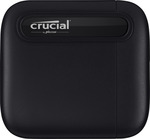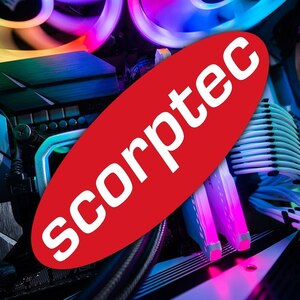Crucial 1TB X6 Portable External SSD, USB 3.2 Gen2 10Gbps, Read up to 540MB/s, Shock and extreme temperature resistant, USB-C Cable
3 Year/s Warranty
Crucial X6 1TB Portable External SSD, USB-C Cable $128 + Delivery ($0 MEL/SYD C&C) @ Scorptec
Last edited 24/01/2023 - 19:36 by 1 other user
Related Stores
closed Comments

Agree!
@chasingstoke the difference is that the OP drive is NOT saturating the speed of the USB 3.2 Gen 2 Bus, as it appears to be limited by the SATA backbone 540MB/s.
I can confirm. One of the fastest & more reliable external SSD drives that I have ever owned. Also Samsung T5/T7 comes with a USB-C to USB-C cable unlike Sandisk/WD/Toshiba SSD drives. I suspect Micron/Crucial X6 also doesn't come with a USB-C to USB-C cable. I never understand why manufacturers do this when the cable itself probably costs less than $1 per each for them.

The T7 Shield is on sale for same price too (better than t7)
https://www.binglee.com.au/products/portable-ssd-t7-shield-1…

USB 3.2 Gen2 10Gbps
So it's not thunderbolt; which means the performance won't be anything like what an internal SSD can reach.
Strangely enough, sometimes in the case of large writes, an older style portable Hard Drive is faster in use, because usually they maintain their speed for the whole write (they're good at sequential data). Where as SSD's without DRAM can fill their cache quickly, and slow down to almost nothing.
Knowing these are built to a price, it's unlikely a DRAM enabled drive, and if you're simply doing BULK writes, I'd be more tempted to get a better interface/protocol, on a traditional portable HDD.

Do you have USB 3.2 ports? As this will be the bottleneck.
USB 3.0 real write speeds are about 10-20MB/sec.USB 3.2 speeds are twice - expect 40-50 MB/sec max write speed.

Are you talking about this specific drive? If we are talking about the protocols in general USB 3.0 port speeds are well in excess of that. Those are more like USB 2.0 speeds.

It's for USB port, not drive.
Don't make mistake - MBps vs MB.
MB is for megabytes.20MB = 160MBps
Try with read files and some external USB drive, also writing simultaneously and don't forget usually Windows is doing AV scan on writes.

@localhost: I ran 250MB/s write via my front USB 3.0 port yesterday. Your numbers are way off. 30 MB/s is nothing for a USB 3.0 port regardless of whatever is going on your PC.
I'm going to assume there is something seriously wrong with your PC.

@eecan: I am glad you achieved impossible, but it's ok, keep going.
250MB/s is 2GBps which is almost half of theoretical speed of the USB 3.0 port (4.8GBps).
Try real tests with more and bigger files, not cached anywhere.

@localhost: If your pic is genuine… a USB 2.0 port on a laptop from more than 10 years ago is faster than your set up…
https://www.youtube.com/watch?v=7TCORt8b92U
Are you sure your own choice of media is not limiting your speed? Is it a USB 2.0 flash drive or a slower SD card?
EDIT: Here is another USB 2.0/3.0 comparison.
https://www.youtube.com/watch?v=sr9xZ6yWSxk (2.0 HDD/3.0 HDD/3.0 SSD)

@eecan: USB is SanDisk Ultra USB 3.0 16GB like this one https://www.officeworks.com.au/shop/officeworks/p/sandisk-32…
but 16GB.
Will check tomorrow with proper 3.1 USB disk.
Similar speeds here - https://www.amazon.com.au/SanDisk-16GB-Ultra-Flash-Drive/dp/…

@localhost: I don't have experience with those USB drives but I'm pretty certain that they are holding you back.
I just checked my 2TB Samsung T7 Shield SSD on my USB 3.0 port and was getting 200-300MB/s write for file transfers. I also tried a Samsung 1TB T5 SSD too and that got me about 80-150MB/s write. The device I mentioned before that was running at ~250MB/s write was a V90 SD card via a USB UHS-II card reader.

20MB = 160MBps
No, its 160 Mbps. Megabits. MBps is Mega Bytes per second. These measurements are case sensitive.
Lowercase 'b' is bits.
The theoretical transfer speed of USB 3.0 is 4.8 Gbit/s (600MBps)
USB 2.0 is 480 Mbit/s (60MBps)
You lose about 10% to overheads.

@localhost: Thats not what you typed though is all, re read your comments.
Also, as you can see its quite easy to get much higher speeds on USB than you're getting.
Something is wrong with your throughput figures.

@MasterScythe: Nope, just this USB drive is too old and that its speed.
Tested with 4TB USB disk and speed is much faster - above 120MB/s.

Based on Tomshardware's review on this drive, it has a SATA SSD inside. It's also QLC. It does employ a fairly aggressive SLC cache and has an aggressive SLC cache recovery. So, while it does use a USB 3.2 gen 2 chipset, its performance is more like USB 3.2 gen 1.
If your transfer is 250GB or less, then the write speed is pretty good. When you have a filled drive, then the actual amount of usable SLC cache is less. Tomshardware indicates the write speed after SLC cache is depleted is around 115MB, which is just a tad above average HDD write speed.
15 minutes sustained write test - Tomshardware - note horizontal axis is time in seconds, not GB written.
If your file transfers are large bulk in nature, then this is not ideal. But if you to scatter the transfers and you do let this SSD recover the SLC cache, then it is probably okay. Single card transfer to this, no issue, but you mentioned multiple concurrently… so it's hard to judge how many you actually have in mind.
If you do want to do last transfer, consider T7 Shield. Note, it's T7 Shield, not regular T7.

Thank you to everyone who commented. Very helpful and I think I am on the right track now.

Wouldn't this one be better? https://www.shoppingexpress.com.au/buy/toshiba-canvio-advanc…
Bigger storage, similar usb-c type connection… just a crappy colour lol
No, that's HDD, not SSD. Also, the SSD posted here is USB 3.2 gen 2 (though it doesn't take full advantage of it, due to being SATA).

Depends on the controller.
As a general statement, no.
But the person who was doing huge writes?
Since we know the person asking is doing a Bulk write of over 700-800GB, then yes, its possible a HDD will be faster, because of the SSD's performance outside of the write cache.
No, HDD won't be faster. The SLC cache gets 500MB/s (you cannot expect HDD to make up 5X the difference: first 250GB, this SSD: 8.4 minutes, HDD: 41.2 minutes (NOT the posted HDD by the way, that one takes even longer), that's a huge deficit to catch up), and the sources are SD cards (which won't be able to pump that much data quick enough), that gives the SSD time to do SLC cache recovery. Its sustained write (according to Tom's Hardware) is 115MB/s. HDDs also suffer from write speed drops. If we are talking about portable (2.5 inch) HDD, especially external portable HDDs (cost effective ones), those won't even reach 100MB/s write.
That's QLC SSD, if it is TLC SSD, then portable HDD has zero chance. Also, we are talking about 1TB QLC SSD. 2TB QLC SSD can optimise even further. Portable HDD might have a chance against 250GB portable QLC SSD. But vs 1TB SSD, there is no contest. That HDD posted is most certainly a shingled HDD (SMR).

If we are talking about portable (2.5 inch) HDD, especially external portable HDDs (cost effective ones), those won't even reach 100MB/s write.
I'm seeing sustained 200MBps from my cheap over the counter Buffalo portable HDD's.
Its sustained write (according to Tom's Hardware) is 115MB/s
I hadn't done the math, but that was what I was basing it on; the fact that my HDD's are almost twice as fast as the SSD shown here during sustained writes.
Though I didn't expect a 250GB SLC cache on a cheap portable (thats higher than a good chunk of internal NVME drives), so, thats neat, and fair enough.



Any users with experience with this drive?
I am looking for something to transfer 750-800gb worth of audio and video files from various cards simultaneously.
Currently using a spinning usb 3.0 drive and it takes up two to three hours per transfer.
Can anyone comment if this would be a good fit for my use case?
Could I expect this to be significantly quicker?
Is there a better option from Samsung/Seagate/Sandisk etc?